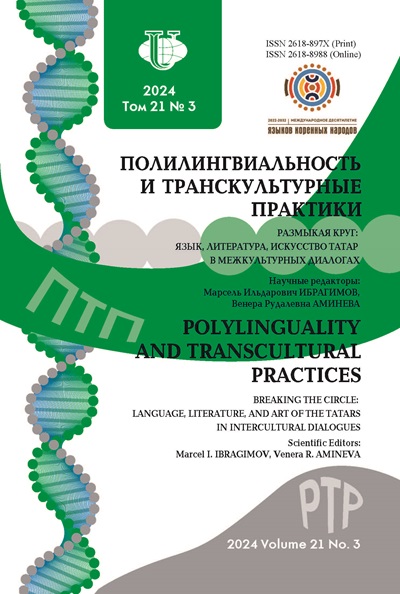From the Scientific Editors of the Issue
- Authors: Ibraghimov M.I.1, Amineva V.R.2
-
Affiliations:
- Academy of Sciences of the Republic of Tatarstan
- Kazan Federal University
- Issue: Vol 21, No 3 (2024): BREAKING THE CIRCLE: LANGUAGE, LITERATURE, AND ART OF THE TATARS IN INTERCULTURAL DIALOGUES
- Pages: 381-384
- Section: To our readers
- URL: https://journals.rudn.ru/polylinguality/article/view/41047
- DOI: https://doi.org/10.22363/2618-897X-2024-21-3-381-384
- EDN: https://elibrary.ru/UHZYED
- ID: 41047
Cite item
Full Text
Full Text
Tatarstan takes a special place in the multinational Russia. For many centuries, different ethnic groups lived on the territory that our republic now occupies: Tatars, Mari, Chuvash, Mordvins, Udmurts, Bashkirs. Here, in various historical periods (the eras of Volga Bulgaria, the Golden Horde, the Kazan Khanate, the Russian state, the Soviet and post-Soviet periods), a special type of culture was formed, based on the dialogical coexistence of languages, ethnic groups, religions. Tatarstan is one of the world-famous centers of science. Famous scientists and theologians lived and worked in Ancient Bolgar, the cities of the Golden Horde and Kazan at different times. Kazan University is one of the oldest universities in Russia, which has given the world many scientific discoveries. The multiplicity of ethnic groups, languages and cultures, which became a favorable factor for the development of the humanities in Tatarstan, largely determined the directions of scientific research by humanitarian scientists of different years. It is no coincidence that one of the topics of the founder of the Kazan linguistic school, I.A. Baudouin de Coutenay, was the mixing of languages. The scientist’s conclusion that there is not a single pure, unmixed language was also facilitated by his direct observations of linguistic and cultural interactions in Kazan. In the 1920s, with the formation of the TASSR, a new period in the history of science in Tatarstan began. In 1921, the Academic Center of the Tatar Commissariat of Education was created in the republic, which carried out the management and coordination of scientific research activities. Over the 10 years that the Academic Center existed, a lot of work was done to organize scientific research in the field of Tatar linguistics, literary criticism, history and ethnography of the Tatar people, the development of Tatar theater and music. Famous scientists took part in the work of the Academic Center: J. Validi, M. Kurbangaleev, G. Rakhim, G. Sharaf, G. Gubaidullin, N. Vorobyov, M. Khudyakov, A. Samoilovich, N.N. Firsov, G.F. Linszer, P.M. Dulsky, H. Badigi, G.H. Alparov; of the late 19th - early 20th centuries: Sh. Marjani, K. Nasyri, R. Fakhretdinova, H. Atlasi, J. Validi and others, as well as scientists from the Kazan Imperial University and the “Society of Archeology, History and Ethnography” which played a large role in the development of Tatar studies. Since 1939, the Tatar Research Institute of Language, Literature and History under the Council of People's Commissars of the Tatar ASSR has become the center of Tatar studies (since 1945, it acquired the status of an academic institution as a part of the Kazan branch of the USSR Academy of Sciences). For 85 years, the Institute (in 1967 it was renamed the G. Ibragimov Institute of Language, Literature and History) has been the main academic institution in Russia, where research is conducted in the field of Tatar language, literature and art. Over the years, scientists of the institute have written hundreds of works on linguistics (V.N. Khangildin, L. Zalyai, L. Makhmutova, D. Ramazanova, G. Akhunzyanov, F. Ganiev, R. Akhmetzyanov, etc.), the history of Tatar literature (G. Khalit, M. Gainullin, H. Khairi, N. Yuzeev, A. Akhmadullin, R. Bashkurov, N. Khisamov, Z. Rame, etc.), folklore (I. Nadirov, Kh. Yarmukhammetov, Kh. Makhmutov, L. Zamaletdinov, F. Akhmetova), history of the Tatar people (R.G. Fakhrutdinov, A.Kh. Khalikov, S.Kh. Alishev, M.K. Mukharyamov, etc.), ethnography (N.I. Vorobyov, Kh. Gimadi, N.F. Kalinin, Smirnov), art history (F. Gizzatullin, P. Dulsky, I. Ilyalova, D. Gimranova, D. Valeeva, G. Valeeva-Suleimanova, etc.). A special place in this history is occupied by the activities within the framework of the Academy of Sciences of the Republic of Tatarstan, established in 1991. Over the past thirty years, Tatar studies have been conducted at the G. Ibragimov Institute of Language, Literature and History, the Sh. Marjani Institute of History, the Institute of Tatar Encyclopedia and Regional Studies and the Institute of Archeology. Over these years, a large number of fundamental scientific projects have been implemented in the field of the Tatar language, literature, history, archeology and regional studies. The issue of the journal offered to your attention presents articles by philologists and art historians of the G. Ibragimov Institute of Language, Literature and History, a number of researchers from scientific and educational institutions of the republic (Kazan Federal University, Kazan Power Engineering University), individual scientists from Moscow and Ufa. The articles presented here are diverse in subject matter. They testify to the multi-vector nature of scientific research conducted by scientists of Tatarstan in the field of philology and art history. At the same time, one topic can be singled out as the main one in the issue: the Tatar language, literature and art in comparative contexts. This testifies to the constant interest of researchers in this problem, which is relevant for modern humanities. The authors, editors of the issue, the management of the G. Ibragimov Institute of Language, Literature and Art of the Academy of Sciences of the Republic of Tatarstan express their deep gratitude to the editorial board of the journal “Polylinguality and Transcultural Practices” for supporting the idea of this issue and facilitating.×
About the authors
Marcel I. Ibraghimov
Academy of Sciences of the Republic of Tatarstan
Author for correspondence.
Email: mibragimov1000@mail.ru
Candidate of Philology, Associate Professor
Venera R. Amineva
Kazan Federal University
Email: amineva1000@list.ru
Doctor of Philology, Professor
References
Supplementary files














